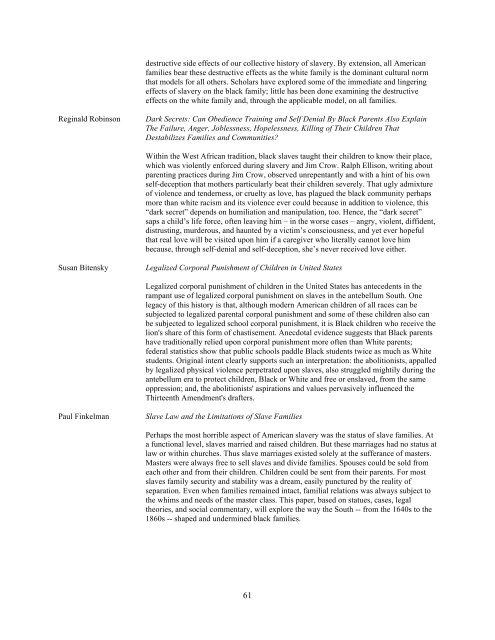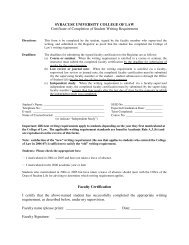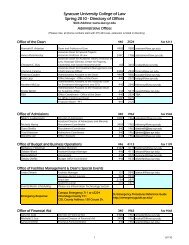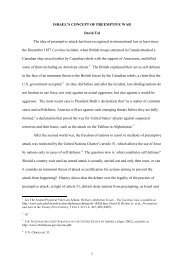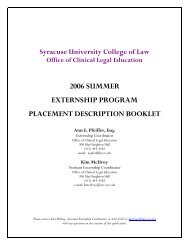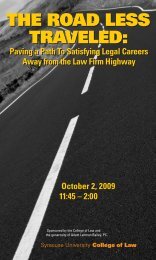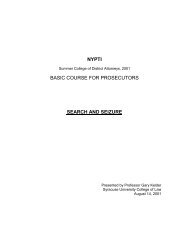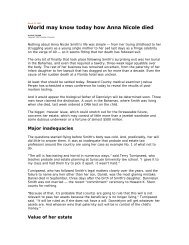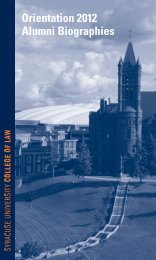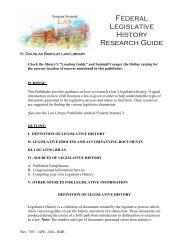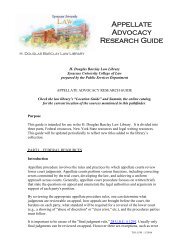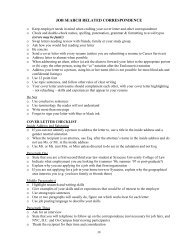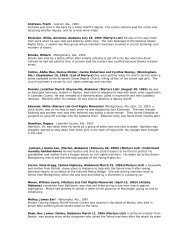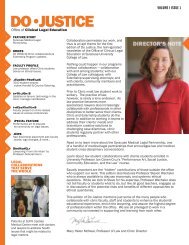2011 Conference Program (PDF) - Syracuse University College of Law
2011 Conference Program (PDF) - Syracuse University College of Law
2011 Conference Program (PDF) - Syracuse University College of Law
Create successful ePaper yourself
Turn your PDF publications into a flip-book with our unique Google optimized e-Paper software.
destructive side effects <strong>of</strong> our collective history <strong>of</strong> slavery. By extension, all American<br />
families bear these destructive effects as the white family is the dominant cultural norm<br />
that models for all others. Scholars have explored some <strong>of</strong> the immediate and lingering<br />
effects <strong>of</strong> slavery on the black family; little has been done examining the destructive<br />
effects on the white family and, through the applicable model, on all families.<br />
Reginald Robinson<br />
Dark Secrets: Can Obedience Training and Self Denial By Black Parents Also Explain<br />
The Failure, Anger, Joblessness, Hopelessness, Killing <strong>of</strong> Their Children That<br />
Destabilizes Families and Communities<br />
Within the West African tradition, black slaves taught their children to know their place,<br />
which was violently enforced during slavery and Jim Crow. Ralph Ellison, writing about<br />
parenting practices during Jim Crow, observed unrepentantly and with a hint <strong>of</strong> his own<br />
self-deception that mothers particularly beat their children severely. That ugly admixture<br />
<strong>of</strong> violence and tenderness, or cruelty as love, has plagued the black community perhaps<br />
more than white racism and its violence ever could because in addition to violence, this<br />
“dark secret” depends on humiliation and manipulation, too. Hence, the “dark secret”<br />
saps a child’s life force, <strong>of</strong>ten leaving him – in the worse cases – angry, violent, diffident,<br />
distrusting, murderous, and haunted by a victim’s consciousness, and yet ever hopeful<br />
that real love will be visited upon him if a caregiver who literally cannot love him<br />
because, through self-denial and self-deception, she’s never received love either.<br />
Susan Bitensky<br />
Legalized Corporal Punishment <strong>of</strong> Children in United States<br />
Legalized corporal punishment <strong>of</strong> children in the United States has antecedents in the<br />
rampant use <strong>of</strong> legalized corporal punishment on slaves in the antebellum South. One<br />
legacy <strong>of</strong> this history is that, although modern American children <strong>of</strong> all races can be<br />
subjected to legalized parental corporal punishment and some <strong>of</strong> these children also can<br />
be subjected to legalized school corporal punishment, it is Black children who receive the<br />
lion's share <strong>of</strong> this form <strong>of</strong> chastisement. Anecdotal evidence suggests that Black parents<br />
have traditionally relied upon corporal punishment more <strong>of</strong>ten than White parents;<br />
federal statistics show that public schools paddle Black students twice as much as White<br />
students. Original intent clearly supports such an interpretation: the abolitionists, appalled<br />
by legalized physical violence perpetrated upon slaves, also struggled mightily during the<br />
antebellum era to protect children, Black or White and free or enslaved, from the same<br />
oppression; and, the abolitionists' aspirations and values pervasively influenced the<br />
Thirteenth Amendment's drafters.<br />
Paul Finkelman<br />
Slave <strong>Law</strong> and the Limitations <strong>of</strong> Slave Families<br />
Perhaps the most horrible aspect <strong>of</strong> American slavery was the status <strong>of</strong> slave families. At<br />
a functional level, slaves married and raised children. But these marriages had no status at<br />
law or within churches. Thus slave marriages existed solely at the sufferance <strong>of</strong> masters.<br />
Masters were always free to sell slaves and divide families. Spouses could be sold from<br />
each other and from their children. Children could be sent from their parents. For most<br />
slaves family security and stability was a dream, easily punctured by the reality <strong>of</strong><br />
separation. Even when families remained intact, familial relations was always subject to<br />
the whims and needs <strong>of</strong> the master class. This paper, based on statues, cases, legal<br />
theories, and social commentary, will explore the way the South -- from the 1640s to the<br />
1860s -- shaped and undermined black families.<br />
!<br />
61


